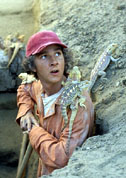
Movie Guru Rating:

Comment
on this review
| |

Holes unearths some American skeletons
by Jesse Fox Mayshark
Disney's Holes is an awkward and often mawkish kids' film, but you can't fault its ambitions. In form, it's reminiscent of the studio's 1970s live-action films (The Apple Dumpling Gang, etc.), or maybe of three or four moralistic after-school specials crammed together. But the morals it presents are, if not coherent, at least complex. Not many children's films these days are interested in the kind of issues Holes is interested in: melting-pot myths, the legacies of racism, America as a land of not just opportunity but redemption.
It's a lot to pile on top of a movie that prominently features body-odor jokes and a soundtrack full of Moby and Shaggy. The worst the filmmakers can be accused of is splashing around in some very deep water. The movie's feel-good imperative inevitably limits its scope and depth. Its heart is in the right place, though, and for a movie about wisecracking teenagers, it's pleasantly uncynical.
Holes is based on a popular book by Louis Sachar, which I haven't read and therefore can't judge the fidelity of the execution. (Exiting the theater, I heard one generally enthusiastic boy offer at least one correction to his father about something "that wasn't in the book." For what it's worth, Sachar wrote the screenplay.) The film draws on a broad and sometimes bewildering range of genres: the prison movie, the western, the immigrant's tale, the star-crossed romance, and not a few swipes from Raiders of the Lost Ark.
It's about a sadsack kid named Stanley (Shia LaBeouf) who gets sent to a juvenile detention camp for stealing a star athlete's sneakers from a charity auction—a crime he insists he didn't commit. He comes from a sadsack family, who live in what looks like Ralph Kramden's apartment, where his inventor father (Henry Winkler—aaaay!) is forever failing to perfect his formula for removing foot odor from shoes. As Stanley bemoans in one of the film's overlapping sets of flashbacks, his family has struggled under a curse ever since his great-grandfather broke a bargain with a village fortune-teller before fleeing Europe for the United States.
At camp, which turns out to be a desert hellhole where juvenile delinquents are forced to dig holes all day, Stanley falls in with your basic Hollywood motley crew, kids' division: There's the fat boy, the leader, the quiet misfit, etc. He becomes especially close to Zero (Khleo Thomas), a diminutive and recalcitrant boy who is also the best digger in camp. The overseer (a squint-eyed Jon Voigt, channeling Jack Palance) says the hole-digging is to "build character," but he also tells the boys to immediately report anything "interesting" they find. Stanley, naturally enough, starts finding "interesting" things, and also starts wondering what the camp's mysterious warden (Sigourney Weaver) is really looking for.
This cues another storyline, which reveals that the boys' camp is on the site of what used to be a lake and a lakeside town. In Dr. Quinn fashion, the town has a lovely and free-thinking schoolmarm (Patricia Arquette), who spurns the advances of a local bigwig (Scott Plank) in favor of the poor (!) black (!!) onion farmer (Dule Hill) who helps her fix up the schoolhouse. Their relationship, of course, can't end well. (The film manages the neat Disney trick of presenting racial tragedy while drastically sanitizing racial issues—the boys' camp, for example, is multiracial, but there's never a hint of racial tension among the kids).
As broad as its strokes are, Holes is grappling with some pretty weighty stuff. Stanley's family curse is emblematic of all the pain of the Old World, all the family grudges and prejudices and scars that made it through Ellis Island. The racial violence, on the other hand, is the sin of the New World—the blood that poisons the water. (Literally—after a racial killing, the lake dries up.) Through a series of coincidences and complicated connections, Stanley and Zero become the vehicle for redemption of all these injustices at once. In the quasi-mystical denouement, the boys wander for days in the desert before finding a convoluted form of salvation. The Biblical analogs are obvious, but as with everything else here, they're borrowed more for form than content—the film's purpose is ecumenical, creating a 21st century version of the American melting pot story in which all transgressions are forgiven and everyone is granted a clean slate.
This is all pretty thin beer—and as nearly nonideological as possible. Fox News types are as likely to bemoan the film's inclusive multiculturalism as NPR types are to blanch at the cheery ease with which it throws bridges across historical chasms. The movie is so intent on affirming the values of forgiveness and reconciliation—and affirming them as quintessentially American values—that it indulges in a lot of wish fulfillment to get where it's going. And its basic lessons about the need to reach across divides hardly make it unique in the universe of children's fables.
Still, this particular fable at this particular time hardly seems like a bad thing—nor does the fact that it took in $17 million at the box office last weekend. I mean, forgiveness and reconciliation aren't exactly being preached from on high elsewhere in the culture at the moment, are they? As a movie, it's not much more than an interesting and sporadically entertaining jumble. But as a cultural phenomenon, it sure can't hurt.

April 24, 2003 * Vol. 13, No. 17
© 2000 Metro Pulse
|